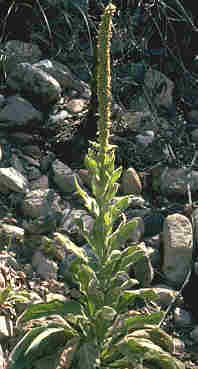
Plant Description
Caution & Interaction

Latin (botanical) name:
Verbascum thapsus
Common names: Lady's Foxglove, Aaron's Rod, Velvet Plant, Shepherd's Herb, Old Man's Flannel, Cow's Lungwort, Clown's Lungwort, Bullock's Lungwort, Donkey's Ears, Torches, Mullein Dock, Our Lady's Flannel, Adam's Flannel, Candlestick Plant, Jacob's Staff, Shepherd's Staff, Beggar's Blanket, Golden Rod, Clot, Cuddy's Lungs, Duffle, Feltwort, Fluffweed, Hare's Beard, Hag's Taper, Great Mullein, Flannel-Flower, Blanket-Leaf
Plant Description: Native to the cool temperate climates of Europe and Asia. It has naturalized itself extensively in the United States and Australia, and commonly grows in poor, hard packed soil in places such as highway embankments and clear cut areas. Mullein is a biennial plant. It's leaves, obovate-lanceolate, are formed into a basal rosette, and covered with fine, hair-like fuzz and feels somewhat woolly. It is a tall plant, and the small, yello, sessile flowers grow in cylindrical spikes close to the long stalk and bloom only a few at a time. The flowers alternately bloom, then wither, then become seed pods. Mullein is a prolific seeder, with each seed pod containing 50 or more seeds in each.
Medicinal Properties &Uses: Mullein's properties include mucilage, gum, a trace of volatile oil, resin, saponins, the flavonoids hesperidin and verbascoside, bitter glycosides, and tannins. Mullein is a valuable remedy for most conditions affecting the respiratory system. As Mullein has a tonic effect on the lungs, Mullein tea or steam loosens lung congestion and relieves a raspy, hacking cough and swollen glands. It calms and relaxes the mucous membranes, making it an excellent remedy for dry, chronic coughs such as whooping cough or colic, tuberculosis, bronchitis, and astma. It's anti-inflammatory properties reduce inflammation, and along with demulcent properties, make it effective in treating tracheitis. Infuse the flowers in olive oil and use warm drops to relieve earache pain, and the oil can be rubbed into rheumatic joints to ease the pain. A tea of the flowers is reported to be sedative and may be used for insomnia. With its anti-inflammatory properties, Mullein is also diuretic, helping to reduce inflammation of the urinary system and alleviating irritating effects of acid urine. The leaves make an excellent poultice for boils and sores, and may be used around swellings, sprains, or mastitis to relieve pain.
Dosage: 30-60 drops in water or juice, 2-3 times daily or as needed. Shake well before using.
Cautions & Interactions: Keep out of reach of children.
Efficacy Studies & Other Clinical Data: Helpful Links:
Disclaimer (U.S. Only): These statements have not been evaluated by the FDA. These products are not intended to diagnose, cure, treat, or prevent any disease.
Common names: Lady's Foxglove, Aaron's Rod, Velvet Plant, Shepherd's Herb, Old Man's Flannel, Cow's Lungwort, Clown's Lungwort, Bullock's Lungwort, Donkey's Ears, Torches, Mullein Dock, Our Lady's Flannel, Adam's Flannel, Candlestick Plant, Jacob's Staff, Shepherd's Staff, Beggar's Blanket, Golden Rod, Clot, Cuddy's Lungs, Duffle, Feltwort, Fluffweed, Hare's Beard, Hag's Taper, Great Mullein, Flannel-Flower, Blanket-Leaf
Plant Description: Native to the cool temperate climates of Europe and Asia. It has naturalized itself extensively in the United States and Australia, and commonly grows in poor, hard packed soil in places such as highway embankments and clear cut areas. Mullein is a biennial plant. It's leaves, obovate-lanceolate, are formed into a basal rosette, and covered with fine, hair-like fuzz and feels somewhat woolly. It is a tall plant, and the small, yello, sessile flowers grow in cylindrical spikes close to the long stalk and bloom only a few at a time. The flowers alternately bloom, then wither, then become seed pods. Mullein is a prolific seeder, with each seed pod containing 50 or more seeds in each.
Medicinal Properties &Uses: Mullein's properties include mucilage, gum, a trace of volatile oil, resin, saponins, the flavonoids hesperidin and verbascoside, bitter glycosides, and tannins. Mullein is a valuable remedy for most conditions affecting the respiratory system. As Mullein has a tonic effect on the lungs, Mullein tea or steam loosens lung congestion and relieves a raspy, hacking cough and swollen glands. It calms and relaxes the mucous membranes, making it an excellent remedy for dry, chronic coughs such as whooping cough or colic, tuberculosis, bronchitis, and astma. It's anti-inflammatory properties reduce inflammation, and along with demulcent properties, make it effective in treating tracheitis. Infuse the flowers in olive oil and use warm drops to relieve earache pain, and the oil can be rubbed into rheumatic joints to ease the pain. A tea of the flowers is reported to be sedative and may be used for insomnia. With its anti-inflammatory properties, Mullein is also diuretic, helping to reduce inflammation of the urinary system and alleviating irritating effects of acid urine. The leaves make an excellent poultice for boils and sores, and may be used around swellings, sprains, or mastitis to relieve pain.
Dosage: 30-60 drops in water or juice, 2-3 times daily or as needed. Shake well before using.
Cautions & Interactions: Keep out of reach of children.
Efficacy Studies & Other Clinical Data: Helpful Links:
Disclaimer (U.S. Only): These statements have not been evaluated by the FDA. These products are not intended to diagnose, cure, treat, or prevent any disease.